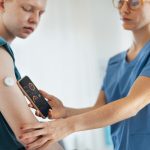Everyone in the healthcare industry, from the hospital’s director to the cleaning crew, is aware of the positive impact of health tech on their work and patients’ lives. In case you don’t know, the global digital health market will most likely reach a value of 650 billion dollars by 2025.
Electronic engineers are, in part, responsible for these innovations. They’re behind improvements like telehealth, and they’ve been helping doctors diagnose and treat conditions that were complicated to spot and treat before. Besides, keeping the confidentiality between doctor and patient requires a lot of digital engineering work that electronic engineers are putting into the field.
It’s high time we discussed the incredible combination of tech and medicine.
Let’s start with medical wearables, such as blood pressure monitors, pacemakers, and hearing aids. For the record, 320 million consumer health and wellness wearable devices were shipped globally in 2022, and by 2024, that number will grow to 440 million units.

Big tech companies like Apple and Samsung are releasing smartwatches with integrated EKG apps. Electronic engineers are responsible for developing these digital platforms and keeping them updated. This might seem like just another app for many. However, for folks with conditions like atrial fibrillation, it can mean the difference between life and death. Keep in mind: the estimations tell us that 17.9 million people in Europe will suffer from this disease by 2060.
AI and its contribution to health tech
If we have to mention one technological discovery revolutionizing the world right now, we must talk about Artificial Intelligence. This software is useful in nearly every professional field, including the healthcare industry, of course.
Electronic engineers can adapt their devices so that they integrate with AI. In turn, this algorithm can analyze lots of data in real-time. Medical professionals get a glimpse into the patient’s health like never before. When we pair this with wearable devices that can store data and share it with hospitals and doctors remotely, we can begin to understand how and why this integration is so important for people’s lives.
For professionals in the healthcare sector, telemonitoring is a great way to keep in touch with long-term patients. People with chronic illnesses often need this kind of attention from their doctors. Through remote monitoring, they can detect anomalies before they become emergencies and provide psychological support to their patients and their families that need it.
Some devices, like robots and drones, allow people to get their medicine without having to travel to a hospital or pharmacy. That’s why a multi-science approach is so necessary: electronic engineers are a fundamental part of the process of innovation.
Clearly, these professionals are revolutionizing the healthcare industry. Their work develops devices and instruments to contribute, and in numerous instances simplify, the incredible work that doctors and nurses are already doing. That’s why it’s so important to have them in your project.
Related content:
The Growing Demand for AI and ML Engineers in the Technology Industry
Quantum batteries and the transformation of the energy industry






